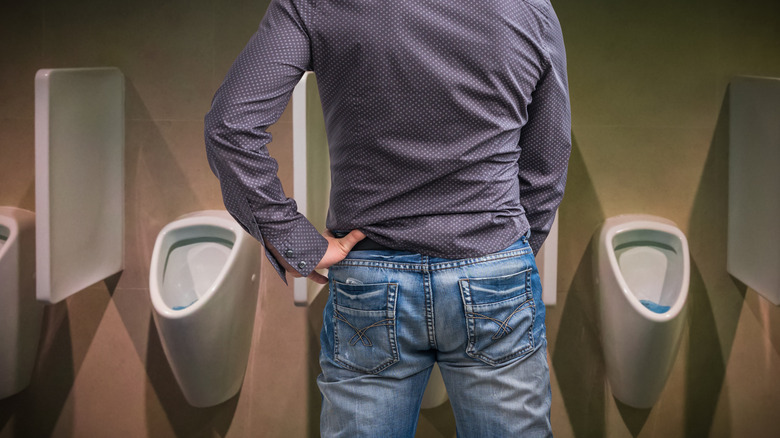Breaking The Seal: Why Men Can't Stop Peeing After Going Once
It's one of the unwritten rules of a night out: Whatever you do, don't "break the seal." Otherwise, you're doomed to spend the remainder of your evening running back and forth between the bar and the bathroom. For the uninitiated, breaking the seal refers to the first restroom trip you take after enjoying a cocktail or two. As the story goes, after that first pee, it's nearly impossible to stop.
Is there any scientific evidence to support the concept of "breaking the seal," or is it merely a myth that we've all come to believe as truth? On the one hand, the increased urine output we experience when drinking alcohol can partially be attributed to upping our fluid intake. For men, the bladder can hold approximately 23 fluid ounces of urine (via InformedHealth.org), yet it only takes about 7 ounces before the need to go number one kicks in, according to Houston Methodist. For comparison, that's not even half of a standard U.S. 16-ounce pint glass of beer. However, there are other reasons as to why men may find themselves returning to the toilet again and again after having "broken the seal."
How alcohol affects the bladder
Another contributing factor is that alcohol has diuretic properties, which means it boosts urine output by hindering the release of vasopressin, a hormone that plays a role in regulating the balance of water in the body (via Houston Methodist). Additionally, alcohol can aggravate the lining of the bladder, making the urge to pee even harder to ignore. Men may face double the bathroom trouble when drinking alcoholic beverages that also contain caffeine, as the stimulant can prompt bladder muscle contractions — all the more reason to sip that Irish coffee with caution.
Some experts believe that breaking the seal may also have a mental connection as well as a physiological one. Judd W. Moul, Director of the Duke Prostate Center Division of Urologic Surgery, told Men's Health that when we relieve ourselves for the first time, our brain creates a positive association, making us want to repeat the action. In other words, the brain sends out a message of, "Well, you peed a little while ago, it felt good, and you should definitely do that again," Dr. Moul told the publication.
Why men should think twice before holding in their pee
While it may be tempting to squeeze those bladder muscles and keep the metaphorical seal unbroken, you don't want to dismiss what your body is trying to tell you. Dr. Moul detailed the potential health risks of doing so, telling Men's Health about a particular patient who did permanent damage to their bladder after holding in their pee for hours following a night of excessive drinking. The man now requires a catheter to urinate every day.
While that may be a more severe example of adverse outcomes associated with holding in your pee, refusing to break the seal when duty calls can alternatively increase the risk of urinary tract infections (via Arkansas Urology). For men with benign prostatic hyperplasia (an enlarged prostate), resisting the urge to go number one can lead to urinary retention, in which the bladder is unable to empty entirely. The National Institute of Diabetes and Digestive and Kidney Diseases (NIDDK) reports that urinary retention can also make a person more susceptible to chronic kidney disease and kidney failure. While repetitive bathroom trips may periodically disrupt your night out, it's worth breaking the seal to preserve one's urinary health. Oppositely, here's what it means if men struggle to hold in their pee.



